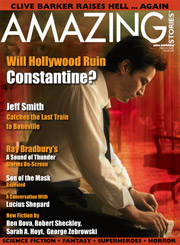"Conversation on Mars" by Robert Sheckley
 "After the Sabines" by Sarah A. Hoyt
"After the Sabines" by Sarah A. HoytThe author has created a story that is about many things, and on many levels. Superficially it is about a world in which the Chinese have colonized the West Coast of the USA; kidnapping women to make up for the gender imbalance caused by their one-child policy and a manufactured virus. The male characters in the book are loners, almost losers; desperately regretting not having fought harder when the raids came and trying to make up for their macho guilt through the self-flagellation of hopeless quests to track down their spouses. In this sense, the story also touches on the power of regret and guilt as motivation. (It is hard to imagine an image more emasculating to the American male ethos than to see the West that we "won" taken over, "our" women kidnapped, and a government too craven to do anything about it).
The real content of the story, however, is the nature of male-female relationships, and it is here that I find it the most troubling. Hoyt indicates that some kidnapped women end up preferring their worshipful new spouses to their grumpy old ones, leading to questions of just how balanced modern male-female relationships are. Do women wish to be placed on pedestals, or treated as equals? Adored, respected, or left alone? The story leaves you wondering.
The tale moved a bit slowly for me as it is largely written as background and exposition. The only real action is in a brief scene with one of the "kidnapped" wives; a scene which brings all of the points of the story into sharp and unsettling focus. The other difficulty for me came from the basic premise, however, as Hoyt shows an Atwood-like ability to suppress reason and logic to the dictates of discussing gender politics and relations. Well-written and with strong characters, I would recommend the story to anyone who appreciates SFnal authors in the same vein such as Atwood or Russ. While it may not be the most thrill-inducing of the stories in this issue, it is most likely the one that will keep you scratching your head afterwards.
"Piker’s Peek" by Ben Bova
This one is simply a lot of fun. Bova has written a story in the finest Golden Age space adventure tradition; anyone who enjoyed tales of space development and intrigue à la "The Space Merchants" by Pohl and Kornbluth will certainly enjoy this. It is told from the point of view of an executive in a conglomerate who gets roped into a shady development deal to build a Las Vegas-style sin city on the moon. The primary complications for him revolve around his partner who is a serial entrepreneur-con man-adventurer with grandiose plans and minimal ethics. Complications including the mob, the board of directors, and mixing business and pleasure give the story it’s roller coaster-ride sensation. Always reliable, Bova delivers an entertaining look at the space business in a way that harkens back to the good old days.
"A Piano Full of Dead Spiders" by George Zebrowski
For me, this is one of those stories that seem to be comprehensible as they unfold. And yet, at the end, you put it down and wonder why it is that what you just read seems so confusing. The things that appear to be clear and comprehensible turn out to be based on ideas, or suppositions, that are in fact fantastic (in the SFnal sense). For instance, Zebrowski does a good job in keeping us guessing about the existence of the spiders and their nature.
In fact, the story is very much about the creative process, and though the medium in question is music it could equally well concern the problems of a painter or an author. "Spiders in the piano" is, as written here, as good an analogy as any for the mysterious and often elusive muse that accompanies the creative process. One could read into the story the concerns of a journeyman author wondering what it is that makes him "good" or bad," and why he is not either "brilliant" or hopeless," and what parts of his personality he needs to tweak to move up or down on the scale. But on what scale do, or should, artists measure themselves? Success? Quality? Critical response? Public acclaim?
Though the prose is occasionally a bit dense, the story is an intriguing and thought-provoking read—particularly to anyone who ponders, from time to time, the mysteries of artistic creation.
"Conversation on Mars" by Robert Sheckley
This was another odd one—I felt as if I was reading a story written by Kelly Link in response to a challenge worded something like "write a Mars colonization story with Russian characters and instruments of torture." And all that in 1,000 words. Kudos to Sheckley, that he can manage to create something as odd and complex as this in such a short space. The vignette is both squirm- and smile-provoking, in addition to which it brings up an unsettlingly timeless question—will the colonization of space resemble Manifest Destiny, or Botany Bay?
Hey, it’s by Sheckley and it’s only a thousand words. Read it.